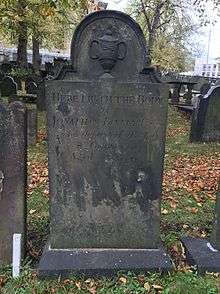Jonathan Binney

_(14594017919).jpg)
Jonathan Binney (January 7, 1723 – October 8, 1807) was a merchant, judge and political figure in Nova Scotia. He was a member of the Nova Scotia House of Assembly from 1758 to 1764. He arrived in Nova Scotia in 1753. He was buried in the Old Burying Ground (Halifax, Nova Scotia).
He was born in Hull, Massachusetts, the son of Thomas Binney and Margaret Miller, and went into business in Boston. Binney married Martha Hall in 1746 and they moved to Halifax seven years later. With others, he lobbied for representative government in the province. His wife died in childbirth in 1757. Two years later, he married Hannah Adams Newton.
He and Joseph Frederick Wallet DesBarres met the Mi'kmaw chiefs at Arichat, Nova Scotia, in 1761, and concluded a lasting peace.[2]
Binney was named to the province's Council in 1764. In the same year, he was appointed collector of provincial duties and magistrate at Canso. In 1768, he became customs collector and judge for St. John's Island (later Prince Edward Island). He was named judge in the Inferior Court of Common Pleas for Halifax County in 1772. When Francis Legge became lieutenant governor, he had Binney and his family arrested because Binney often paid himself first with the funds collected on behalf of the government. Binney successfully brought his case against Legge before the Board of Trade in London and his debts were forgiven by the Nova Scotia assembly. In 1784, Binney was accused of certifying New England fisherman as Nova Scotians so that he could sell them fishing licenses. He died in Halifax.
References
- Bumsted, J M (1983). "Jonathan Binney". Dictionary of Canadian Biography Online. Retrieved 2008-09-30.